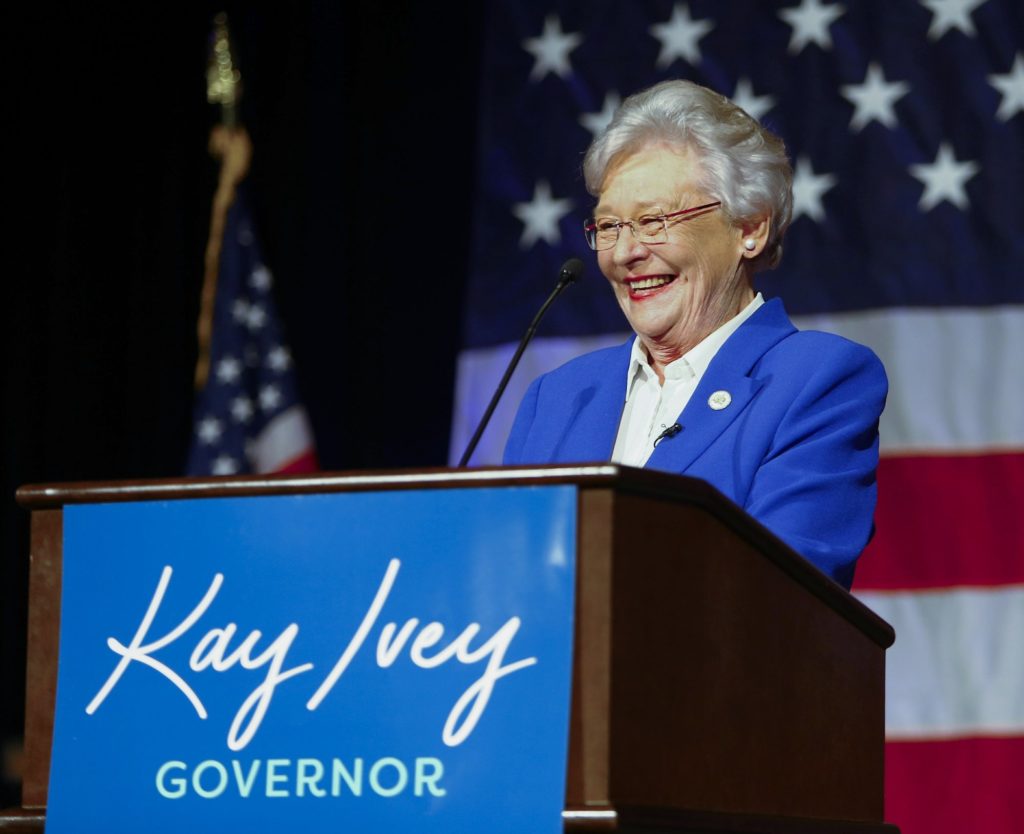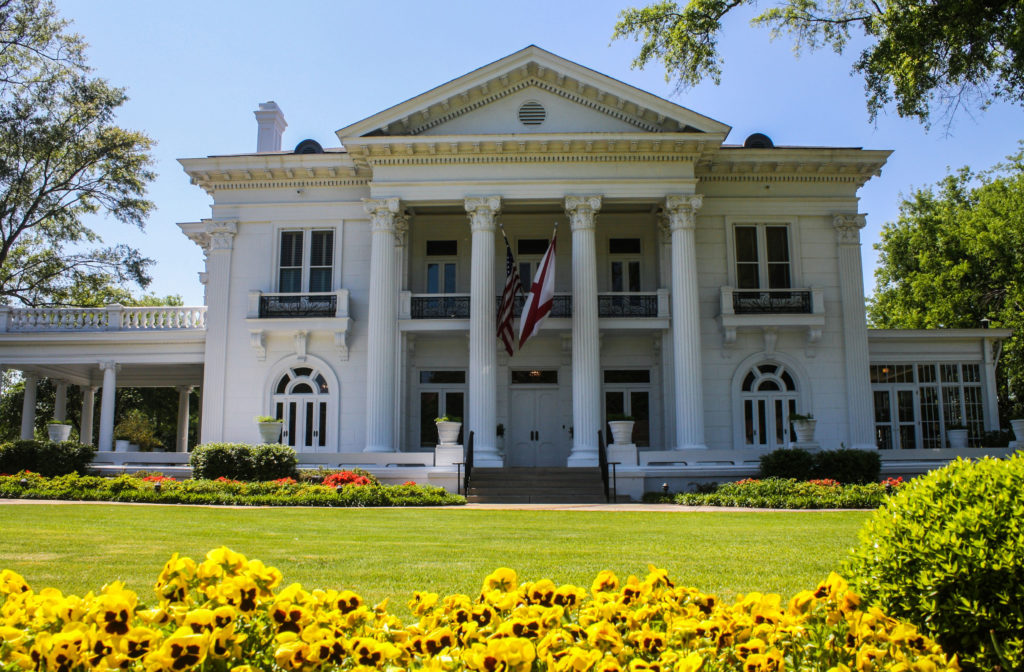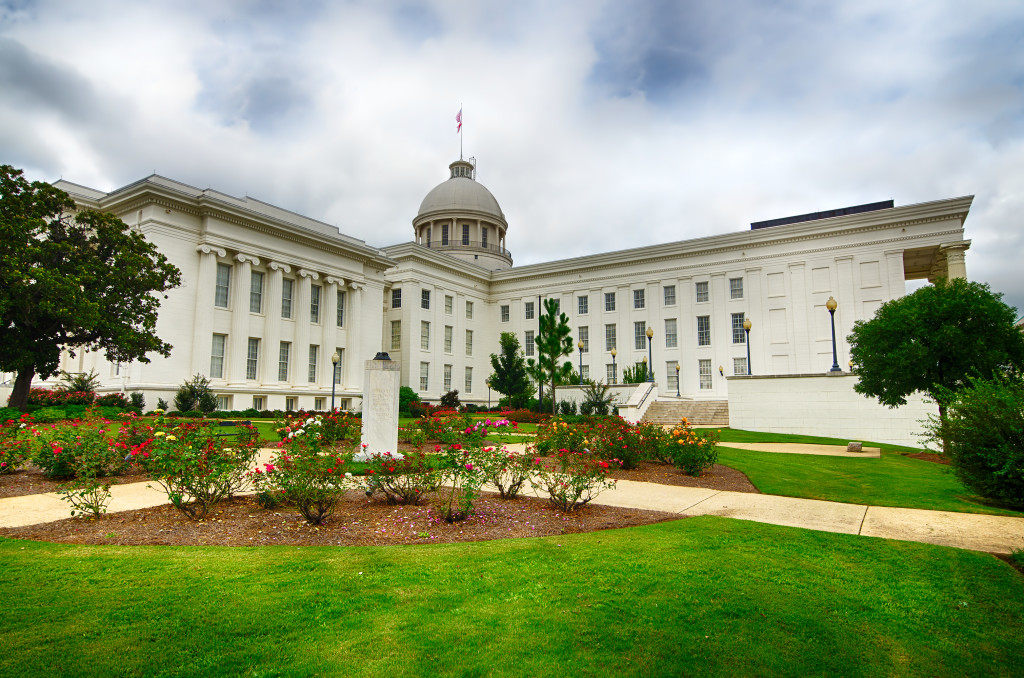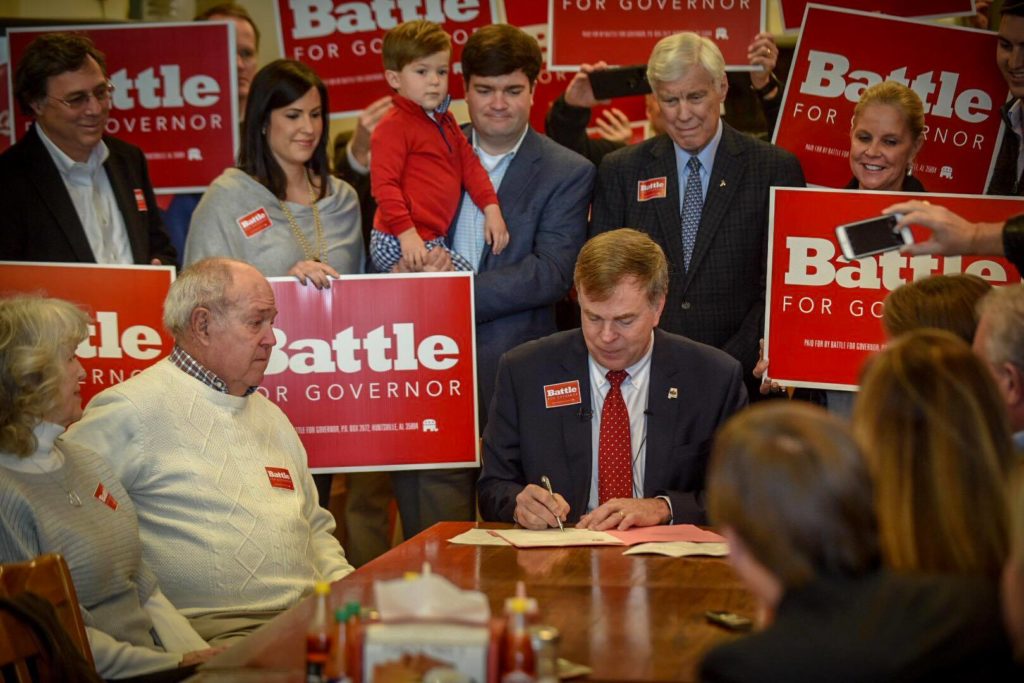In governor’s race, issues of age, health and forthrightness

Gubernatorial challenger Walt Maddox’s introductory television ad aimed to convey crucial details to voters. He described rebuilding tornado-ravaged Tuscaloosa as the city’s mayor and called his politics “pro-life and pro Second Amendment.” He also emphasized his age. “I’m Walt Maddox. I’m 45 years old,” Maddox said at the ad’s start. In Alabama’s race for governor, the issue of age and health has awkwardly rippled as an undercurrent as the 74-year-old incumbent Gov. Kay Ivey faces the 45-year-old Democrat. In the GOP primary, Ivey’s younger male opponents challenged each other to release their medical records and said the state needed a governor with energy and stamina while simultaneously maintaining that they weren’t directly questioning Ivey’s health. The undercurrent — and along with it accusations of secrecy and malfeasance — burst to the surface Tuesday. The state’s former top law enforcement officer came forward with claims that Ivey was hospitalized for stroke-like symptoms during a state trip three years ago and that her office directed the trooper not to tell superiors. Ivey adamantly denied the accusations, saying she had altitude sickness and releasing a letter from her doctor. Spencer Collier, who served as the state’s top law enforcement officer at the time, told The Associated Press Tuesday that the trooper traveling with then-Lt. Gov. Ivey reported to his commanding officer that Ivey developed stroke-like symptoms during the trip and had a transient ischemic attack. “The trooper noticed that she was incoherent and made the decision to transport her to the emergency room,” Collier said. “Initially, I was told when they brought her to the hospital it was stroke-like symptoms. In the following days we were briefed it was a TIA,” Collier said. TIA is shorthand for transient ischemic attack. According to the American Stroke Association, a transient ischemic attack is a temporary blockage of blood to the brain, caused by a clot or blockage and is sometimes referred to as a mini-stroke or warning stroke. During the 2015 incident, Collier said the trooper also reported that Ivey’s chief of staff, Steve Pelham, had directed him “not to tell anyone, including his chain of command.” Collier said Ivey also later asked to have the trooper reassigned. Collier said he was not attacking Ivey’s health, noting he himself had health problems. He said he was more concerned about the instructions to the trooper to hide the matter. “Don’t take it lightly when you instruct troopers not to tell the truth,” Collier said. Pelham now serves as Ivey’s chief of staff in the governor’s office. Ivey told reporters Tuesday evening that she had “altitude illness” and released a letter from her doctor. “The letter I released today from my doctor clearly confirms what I’ve been saying all along that I’m in good health,” Ivey said. Dr. Brian Elrod said he was aware of the hospitalization and examined her a day after her discharge. “During my examination I saw no evidence of a transient ischemic attack and learned that the extensive work-up done at the Denver hospital, including an MRI, a carotid ultrasound and labs were all negative,” Elrod wrote. The letter did not say how long she was in the hospital. Elrod said he could not confirm what condition led to the hospitalization, but said he considers Ivey to be low risk for a cardiovascular event. Ivey spokesman Daniel Sparkman disputed the claim that the trooper was told not to tell his superiors. “The answer is: No… Besides, there was nothing to cover up,” Sparkman wrote in a text message. Collier said he would be willing to take a polygraph to show he is telling the truth. He said the matter was also reported to the division chief over dignitary protection and then-Gov. Robert Bentley. Bentley did not respond to a message seeking comment. Efforts to reach the division chief and trooper were unsuccessful. The two campaigns took swipes at each other. “Like most Alabamians we were shocked to learn that Governor Ivey possibly had a stroke and attempted to cover it up. We are examining all the available information and Walt will have more to say very soon,” the Maddox campaign said in a statement issued Wednesday. Ivey on Tuesday blamed the Maddox campaign for the Collier accusation. “It’s plum sad that Mayor Maddox’ campaign is pushing this issue out just three weeks before an election,” Ivey said. “It makes me have to assume Mayor Maddox is desperate because his liberal record is not connecting with Alabamians,” Ivey said. Throughout the primary, Ivey has alternately bristled to questions about her health or responded with folksy humor that age brings wisdom. In a speech at the University of Alabama’s football stadium, she suggested her experience was a good thing. “The state of Alabama is looking for a head coach. I’m the only person applying for the job who has actual experience coaching at this level,” Ivey said, adding “who would ever consider somebody who’s never coached a single game at this level to be head coach,” Maddox in similar football-themed retorts has suggested the state would fire a coach with the state government’s record. Republished with permission from the Associated Press.
Many states’ governor’s races become proxy battle over Donald Trump

It’s a resume that reads like an ideal springboard to higher office: investigated sexual assaults of Olympic gymnasts, charged government officials responsible for a tainted water crisis, bucked the governor on tax hikes. With that background and his party controlling all statewide offices, Republican Attorney General Bill Schuette might be on the fast track to winning the Michigan governor’s race in November. One reason he’s not: President Donald Trump. Schuette is an outspoken supporter of the president, who narrowly won the state in 2016 but has declined in popularity since. “I’m not going to run away from any issue,” he said. “I appreciate the support of the president, and I stand by my record of achievement.” As with many races around the country, this year’s midterm campaigns for governor are in many ways proxy fights over support or opposition to the Trump administration. Richard Czuba, a nonpartisan pollster in Michigan, said voters in every age group are more motivated to get to the polls than he’s seen in his 35-year career. He said independent voters are leaning toward supporting Democrats this year largely because of their distaste for Trump. “It’s an environment like nothing I’ve ever seen,” said Democratic nominee Gretchen Whitmer, a former legislative leader, who has held an edge in state public opinion surveys. She has spoken against Trump’s policies but said she is much more focused on fixing Michigan problems. The theme of a Trump-backed Republican and a left-of-center Democrat locked in a close election contest runs through many of the 36 races for governor on the ballot this year. Trump’s relative unpopularity is another challenge for Republicans, who already were bracing for tough governor’s races this year after having unprecedented success during former President Barack Obama‘s tenure. Republicans have dominated state elections across the country since 2010, the first midterm election after Obama took office. Even after losing in New Jersey last year, Republicans hold a near-record 33 governor’s offices compared to 16 for Democrats (Alaska’s governor is an independent). Most of the races expected to be close this year are in states where Republicans currently serve as governor. In addition to Michigan, swing states that include Florida, Maine, Nevada and Ohio have open seats where the current GOP incumbent is termed out. Incumbent Republicans are locked in tough races in Arizona and Wisconsin, drawing millions of dollars in independent expenditures. The GOP is aiming to pick up governor’s seats in Connecticut and Colorado, states with open seats where Democrats now hold the job, and to re-elect incumbents in three other states in New England, a region that overwhelmingly sends Democrats to Congress. Why does it matter? Aside from holding executive powers and overseeing state agencies, governors in many states can approve or veto the maps drawn once a decade for congressional and state legislative seats. That process determines which party will hold political power for years to come. The next round of redistricting will happen after the 2020 Census, giving governors who win this year the ability to approve or veto the new maps. An arcane process typically of interest to political insiders, redistricting has rocketed to national attention in the past two years. Republicans seized control of state legislatures and governor’s offices in 2010 and proceeded to draw districts heavily favoring their party in many states, even those where voter registration is about equally split between Democrats and Republicans. That process, called gerrymandering, has given Republicans outsized influence in Congress and state legislatures, and it’s a dynamic Democrats hope to begin reversing by retaking governor’s offices. “People recognized that if we were going to have some bastion of protection for civil rights, it’s to have a check on Donald Trump,” Washington Gov. Jay Inslee, chairman of the Democratic Governors Association, said in an interview. “And the only way to do that is to stop this gerrymandering.” His group is targeting eight states where governors have a redistricting role. It believes flipping the governor from a Republican to a Democrat would put the party in position to pick up 20 seats in the U.S. House of Representatives with the next maps. Jon Thompson, a spokesman for the Republican Governors Association, downplays gerrymandering as a motivating issue this year and portrays it as part of the regular push-and-pull of politics. Redistricting is one of many issues in play in governor’s races across the country. Health care is another, and many surveys show it as a top concern for voters. The Medicaid expansion that was part of Obama’s Affordable Care Act is emerging as a key issue in many states. That includes Florida and Georgia, which have open races and where the Democratic candidates are trying to become their state’s first black governor. Protecting older Americans from higher insurance premiums and protecting those with pre-existing medical conditions are other hot-button topics. In Michigan, health care is a dividing line between the candidates. As attorney general, Schuette joined with other Republican attorneys general in litigation seeking to overturn the Affordable Care Act. Democrats are criticizing him for not fighting a separate lawsuit that threatens protections for patients with pre-existing conditions that Obama’s law put in place. That stance alone threatens to undermine any goodwill Schuette had built up by launching investigations into the lead-tainted water crisis in Flint and into Michigan State University’s handling of sexual assaults by Larry Nasser, the former team doctor for USA Gymnastics. Instead, he’s campaigning on a pledge to cut taxes, reduce auto insurance rates and improve student reading scores. Whitmer is focusing her campaign on cleaning up drinking water across the state, rebuilding roads and maintaining the expansion of Medicaid that she helped developed with current Gov. Rick Snyder, a Republican. It provides health coverage to 663,000 lower-income adults. She voted for the expansion of Medicaid as a lawmaker while Schuette opposed it. He recently suggested that he would not undo the program but said he wants to implement GOP-enacted work requirements that are scheduled to take effect in the state
Steve Flowers: Kay Ivey’s support is a mile wide and an inch deep

We are less than four weeks away from our June 5th primary. Those of us who follow Alabama politics have pointed to this year as being a very entertaining and interesting gubernatorial year. However, last year’s resignation by former Governor, Robert Bentley and the ascension of Kay Ivey from Lt. Governor to the Governor’s office has put a damper on the excitement we anticipated in the governor’s race. Kay took over the reins of state government and her appearance as a seasoned veteran of state politics seems to resonate with voters. Polling indicates that the governor’s race is hers to lose. Therefore, the less she does may be the best course. Her support is a mile wide and an inch deep. A slip and fall could derail her train. Her perch reminds me of a story surrounding the last truly colorful southern governor, Edwin Edwards of Louisiana. Ole Edwin had a wide lead like Kay’s in the polls a few weeks prior to his race for reelection as governor of the Pelican state. The press asked him about two weeks out about his significant lead in the polls. Edwin’s reply was, “Yeah, the only way that ole Edwin can lose this race is to get caught in bed with a dead woman or a live boy.” Tommy Battle, the popular Mayor of Huntsville is poised to make a formidable run at Kay in the closing weeks. He has some money in the bank and will come out of the vote rich Tennessee Valley with a good friends and neighbors vote. The Evangelical Roy Moore voters appear to be coalescing around Evangelist Scott Dawson. My guess is that Walt Maddox, the young 45-year old Mayor of Tuscaloosa is benefitting from a grass roots support among African American voters in the Democratic primary. If indeed this is the case, Maddox will be favored to capture the Democratic nomination. Will Barfoot has emerged as the frontrunner in the closely watched open Montgomery/River Region Republican seat. Incumbent State Senator Paul Bussman is in a close contest with Cullman City Council President Garlan Grudger. Polling indicates that this one may be too close to call. Bussman’s departure from the GOP Senate Caucus has given his constituents the perception that he may be rendered ineffective. This district is politically savvy. Veteran educator, Wayne Reynolds, may be poised to win the State Board of Education District 8 seat in the Huntsville-Tennessee Valley area being vacated by Mary Scott Hunter. Mary Scott and Sam Givhan are battling for an open state Senate seat in Huntsville. This race is one of the best Senate races in the state. Both Givhan and Hunter are heirs to great Alabama legacies. Givhan’s grandfather was legendary Black Belt State Senator Walter Givhan. Ms. Hunter’s daddy, Scott Hunter, is one of Bear Bryant’s famous quarterbacks. Speaking of legends, Alabama political icon, Milton McGregor, was laid to rest a few weeks ago. He would have been 79 today. Montgomery’s Frazer Memorial Methodist Church was overflowing. A good many of the state’s past and present political powers were there, including several past governors and a sitting U.S. Senator. One of the state’s most famous and personable preachers, John Ed Mathison, presented a masterful sermon. He is a great man. He and his wife were best friends with Milton and Pat. It was actually a joyous political homecoming event. As folks were visiting and reminiscing, one of Alabama’s most prominent pulmonary physicians, Dr. David Thrasher, who has been a doctor to many famous Alabamians and was one of Milton’s pallbearers was visiting with me and said, “Steve, I was at Governor Wallace’s funeral when Franklin Graham spoke and it doesn’t compare to this.” Then he quipped, “Steve, I got a call from Billy Graham. He said that he had met a nice guy at breakfast by the name of Milton McGregor. Milton said to tell John Ed to remind the people down here that if they did good and believed in Jesus that they could be a winner too and join him.” That’s what John Ed said. See you next week. ••• Steve Flowers is Alabama’s leading political columnist. His weekly column appears in over 60 Alabama newspapers. He served 16 years in the state legislature. Steve may be reached at www.steveflowers.us.
Steve Flowers: Breaking down the 2018 governor’s race

When talk turns to politics in Alabama, it usually leads to the Governor’s race. In Alabama politics the Governor’s office is the Brass Ring. It is talked about more than anything else around coffee clubs and kitchen tables from Sand Mountain to the Wiregrass. It is comparable to college football being the king of all sports in Alabama. This infatuation with the Governor’s office is borne out in voting history. In most states the Presidential race sees the largest voter turnout, but that is not the case in Alabama where we have historically voted more heavily in gubernatorial years. Governor race years also have most of the important local offices up for grabs. “All politics is local.” Kay Ivey enters the race as the favorite. She is the quasi incumbent having taken over the ship of state this time last year from beleaguered and tarnished Governor Dr. Robert Bentley. She probably would have gone to the house with her dog Bear with the plaudits of having served two terms as State Treasurer and two terms as Lt. Governor, which is not a bad legacy. However, now she can add Governor to her epitaph. Kay has been around Alabama politics for quite a while. She has been thought of as vibrant over the years. However, recently her demeanor and appearance belies the fact that she is only 73. This premature aging becomes apparent when she gets out campaigning and speaking. This elderly resonance and cognizance will not detract from her being elected to a full term. However, if I were running her campaign, I would limit her appearances. They should keep her in the Governor’s office and use photos from a few years back and take credit for the upturn in the economy. Her support is a mile wide and an inch deep. A slip and fall could derail her train. My first term in the Legislature was George Wallace’s last term as Governor and to say he was incoherent would be an understatement. He was on heavy doses of medication to alleviate the constant pain he had to endure from the bullet wounds from an assassination attempt while he was running for President in 1972. Therefore, Kay’s slowness does not deter her from being elected or from probably doing a better job than most governors we have had. My observation over the past 50-years is that we really do not have to have a full-time governor of Alabama. Big Jim Folsom was drunk his entire second term, George Wallace was on pain pills his last term and did not know where he was, Fob James was totally disinterested in being governor his second term and went duck hunting the whole time. They put Don Siegelman and Guy Hunt in jail. Poor ole Bentley fell in love at 72 like a little school boy and walked around with a glazed look in his eyes and sheepish grin, and lost all sense with reality. They kicked the poor old fellow to the curb. Kay came on board and seems to have steadied the ship of state. Kay’s most daunting opponent is Huntsville mayor, Tommy Battle, who is actually responsible for the largest economic development announcement for the state in the past several years. The landing of the Toyota-Mazda plant in Huntsville several months ago was a real coup. Battle is 61 and has been Mayor of Huntsville for over 10 years. Some would argue that if he could do half of what he has done for Huntsville for the State of Alabama, he would be the best Governor Alabama has had in generations. Mayor Battle has raised a lot of money and will come out of the vote rich Tennessee Valley with a strong base of support. He may give Kay a run for her money. Birmingham Evangelist, Scott Dawson, is hoping to garner the evangelical vote. He is running a spirited campaign and could be a factor. State Senator Bill Hightower from Mobile is somewhat of an aloof fellow, who will probably not be a factor. Whoever wins the Republican nomination will be favored to win the race in November. The odds favor a Republican 57-to-43. However, you have two formidable thoroughbreds vying for the Democratic nomination. Former Chief Justice Sue Bell Cobb and Tuscaloosa Mayor Walt Maddox will fight it out for the nod in the June 5th Primary. There probably will not be a runoff. Either Cobb or Maddox will win outright depending on which way Alabama’s African American voters land. Most observers predict that Walt Maddox will prevail. He is 45 and has been Mayor of Tuscaloosa for 10 years. Being mayor of a major city is probably the best training ground for governor. See you next week. ••• Steve Flowers is Alabama’s leading political columnist. His weekly column appears in over 60 Alabama newspapers. He served 16 years in the state legislature. Steve may be reached at www.steveflowers.us.
Bill Hightower qualifies for Alabama governor race

State Sen. Bill Hightower qualified with the Republican Party of Alabama to appear as a candidate for Governor on the primary ballot June 5. Regarded as one of the most conservative senators in Alabama, Hightower has continually backed legislation for smaller government, lower taxes and to change Alabama to the flat tax. He currently runs several small businesses, which he believes makes him distinctively qualified to advance job-growing policies for families in Alabama. “I want our businesses and families to flourish,” said Hightower. He continued, “I am excited about this next step in our journey. We have focused our campaign on my strong conservative record of reform, our conservative vision for Alabama’s future, and our commitment to the people of Alabama that tomorrow will be better than today. We can do better. The outpouring of support we have received from all corners of the state has been humbling. I am confident that with the support of my family and the thousands of Alabamians who are rallying behind our message we will bring the change necessary to turn Montgomery around.” Hightower believes Montgomery is defective and needs change to bring hope to communities all across Alabama. He has also promised a balanced budget, and to make sure faith is protected statewide if he is elected governor. He graduated from the University of South Alabama, received an M.B.A. from Vanderbilt University, and has worked with with several Fortune 100 corporations including Emerson Electric, AlliedSignal, Eaton Hightower is married to Susan Binegar Hightower. They have three children, and three grandchildren.
Tommy Battle qualifies for governor’s race

On Thursday, Tommy Battle, the current mayor of Huntsville, qualified as a gubernatorial candidate in the Republican primary. In a packed restaurant in Hoover, surrounded by his family, friends and supporters, Battle signed the paperwork to make his run official. Battle has his sights set on being Alabama’s new leader. “I’m running for governor because we’re in a battle for Alabama’s future, and I’m ready to lead us in a new direction,” said Battle. “While the ship of state may be settled, it is time to move it forward. Alabama has been stagnant for far too long, and I’m ready to get us moving forward.” Battle has been Huntsville’s mayor for the past nine years. Huntsville is one of the fastest growing major cities in the state, every day, 6 new people are moving to Huntsville’s metro area. During his time as mayor, Battle said he’s assisted in recruiting over 25,000 jobs to the area. Just in the last week, Battle and Gov. Kay Ivey announced Toyota and Mazda’s new 1.6 billion dollar manufacturing facility which will bring 4,000 new jobs to the area. The job growth Battle has helped recruit has generated more than 4.1 billion dollars in economic investment for the Huntsville area, and Battle wants to bring that same success to the rest of the state. “We’ve had a lot of success because our plan works,” stated Battle. “We’re ready to take that plan to Montgomery and work on behalf of all of Alabama’s 67 counties.” Currently, the Republican candidates who have officially qualified are Gov. Kay Ivey, Tommy Battle and Michael McAllister. Sen. Bill Hightower and Pastor Scott Dawson have also declared their candidacies for governor but have not formally qualified yet. Battle and Ivey are well ahead of the competition when it comes to fundraising. Ivey has currently raised more than $2 million, and Battle almost $1.2 million. The Democratic and Republican primaries will be held on June 5 with the general election on Nov. 6. Photos Via Tommy Battle’s facebook page.


